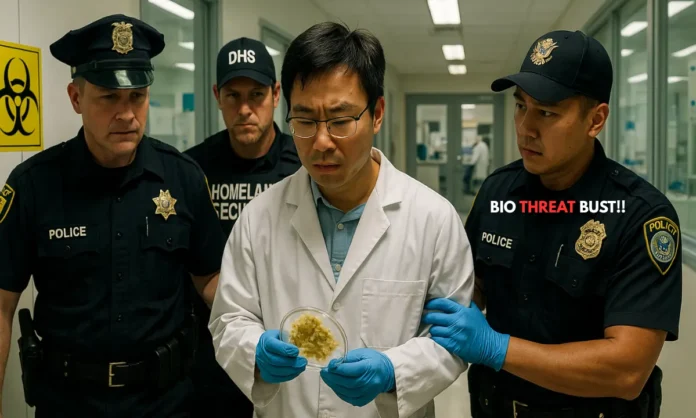Summary
- A Chinese researcher smuggled Fusarium graminearum—a known agroterrorism pathogen—into the U.S. for unauthorized lab research.
- The Department of Justice alleges the smuggling could have jeopardized public safety and agricultural security across multiple states.
- This case adds fuel to mounting U.S. fears about China’s biotechnology ambitions and possible dual-use bioweapons programs.
A Fungus with Fallout: When Research Crosses the Line
The quiet corridors of a University of Michigan lab became the epicenter of an alarming international incident in June 2025, when U.S. authorities announced the arrest of a Chinese national for smuggling a dangerous agricultural pathogen into the country. The fungus, Fusarium graminearum, is not just any soil-dwelling microbe—it’s an economic and biosecurity threat responsible for billions in crop losses worldwide.
The incident has taken on a geopolitical undertone, given the U.S. Justice Department’s characterization of the smuggled fungus as a potential agroterrorism weapon. At a time when global food security is already vulnerable to climate volatility, war, and trade disruptions, the deliberate unauthorized transport of such a pathogen sends shockwaves through both scientific and political institutions.
The two accused—Zunyong Liu, a Chinese researcher, and Yunqing Jian, a lab employee in Michigan—allegedly bypassed multiple biosecurity protocols. Their actions, captured in intercepted electronic communications, point to coordinated planning, including discussions about research applications and logistics. As the story unfolds in courtrooms and labs, it raises an urgent question: Where does legitimate scientific inquiry end, and strategic sabotage begin?
U.S. FACING THREAT OF TERROR ON ALL FRONTS
— 𝐉𝐎𝐇𝐍 𝐖𝐈𝐂𝐊 𝕏ʰⁱᵗᵐᵃⁿ 🔫 (@imUrB00gieman) June 3, 2025
AGROTERRORISM TO VISA OVERSTAYS
🚨 DOJ: CHINESE NATIONALS CHARGED WITH SMUGGLING ‘POTENTIAL AGROTERRORISM’ FUNGUS INTO THE USA#ConnectTheDots 🧐 pic.twitter.com/EbIpuSGqFt
A Smuggled Fungus and the National Security Response
- The fungus causes Fusarium head blight, decimating wheat and barley crops globally.
- U.S. officials allege that the pathogen entered Michigan via commercial flight baggage.
- The FBI cited “an imminent threat to public safety” in its official statement.
- The accused face charges of smuggling, conspiracy, false statements, and visa fraud.
- U.S. agencies are investigating whether this was a lone act or part of a broader pattern.
At the core of the controversy is Fusarium graminearum, a pathogen known to reduce crop yields by up to 50% and contaminate grains with mycotoxins. Its transport across borders is tightly regulated due to its potential to disrupt food supply chains and inflict billions in economic damage.
According to the FBI’s criminal complaint, Liu smuggled fungal samples from China into the U.S. during a 2024 visit to see Jian, his girlfriend and lab researcher at the University of Michigan. The pair reportedly intended to run private experiments using the university’s resources—without institutional approval or biosafety clearance.
Cheyvoryea Gibson, Special Agent in Charge at the FBI Detroit Field Office, didn’t mince words. “The pair’s actions posed an imminent threat to public safety,” she said, citing the high transmissibility and destructive potential of the fungus. Jian, arrested in Michigan, is now facing court proceedings. Liu, currently in China, may face extradition efforts.
The case underscores increasing tension between open academic exchange and national biosecurity. With growing fears about dual-use research—scientific work that can be weaponized—this case could serve as a watershed moment in how U.S. institutions handle international collaborations in sensitive research fields.
Bio-Diplomacy Under Scrutiny: China’s Biotech Ambitions Questioned
- The U.S. has warned about China’s biotech militarization in recent congressional reports.
- The incident coincides with fears of AI-powered biological warfare tools.
- Analysts say China’s biotech rise is now seen as a ‘strategic enabler’ for grey-zone conflict.
- The Axiom of “unintentional accidents” is wearing thin in U.S. intelligence circles.
- Agroterrorism is being reclassified as a tier-one domestic threat in updated DHS protocols.
While this may appear to be an isolated criminal case, experts argue it reflects a deeper geopolitical undercurrent. Recent U.S. Commission reports have warned that China’s ascent in biotechnology is not solely about pharmaceuticals or medical innovation—it may also serve military or espionage interests. The same tools used to fight cancer or feed nations can, in theory, be turned toward weaponizing food supply chains.
Fusarium agroterrorism China 2025 is now more than just a headline—it’s a dossier. The timing is telling. The U.S. is reevaluating its foreign researcher visa policies, tightening controls on sensitive scientific material, and questioning long-standing collaborations with Chinese institutions. In parallel, bioethicists are calling for an international treaty on pathogen transport and dual-use research safeguards.
The FBI’s rapid response—conducting digital forensics on communications, physically isolating the fungal samples, and launching cross-agency investigations—signals a high-priority classification. Analysts argue this event may lead to a redrawing of red lines in cross-border science.
Beyond the Petri Dish: Redefining Research Accountability
The incident raises uncomfortable questions for American academia. How do publicly funded research institutions guard against misuse of their open-door policies? Should every foreign researcher be viewed through a lens of suspicion? How can the U.S. distinguish between a legitimate academic visitor and a covert threat actor?
Some argue for better screening and licensing for dual-use biological material, while others warn against stoking xenophobia or derailing international scientific cooperation. The challenge lies in nuance. Not every imported microbe is a bio-weapon, but as this case shows, even a single petri dish—transported in the wrong way, by the wrong hands—can ignite a geopolitical firestorm.
As the trial proceeds, the case of Fusarium agroterrorism China 2025 will likely become a defining moment in how the U.S. recalibrates its policies on biosecurity, academic freedom, and science diplomacy. The answers won’t be found in a microscope—but in the courtroom, the legislature, and perhaps, in the global arena of 21st-century ethics.


